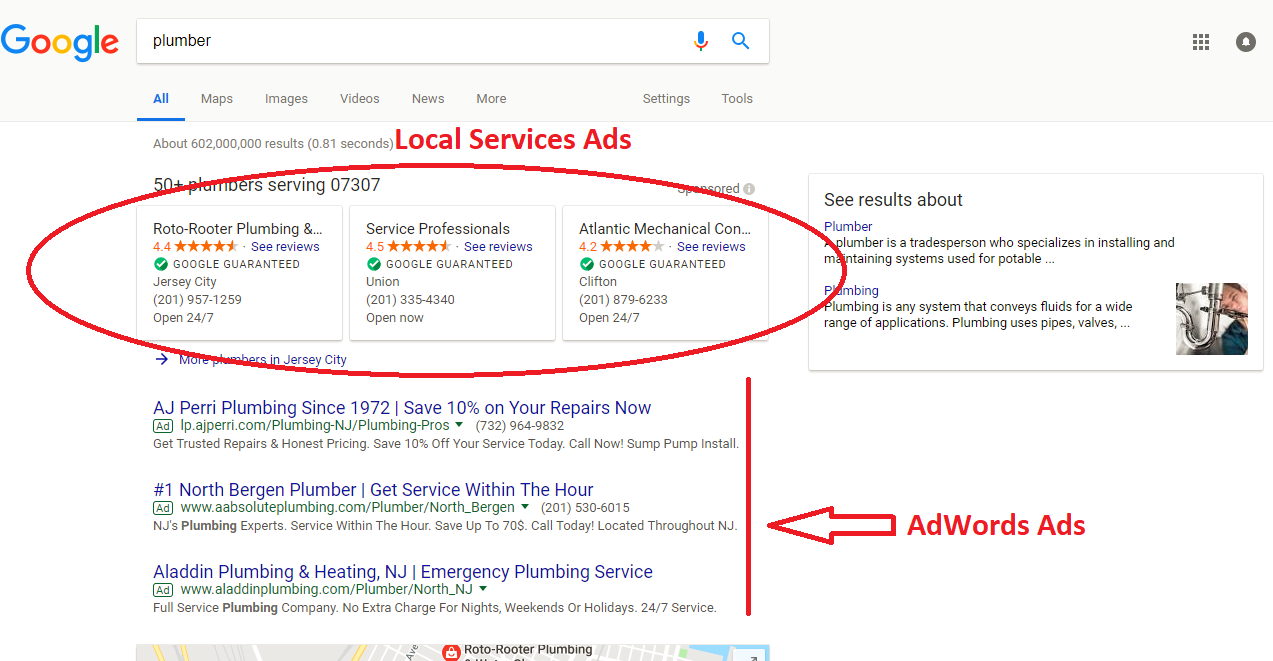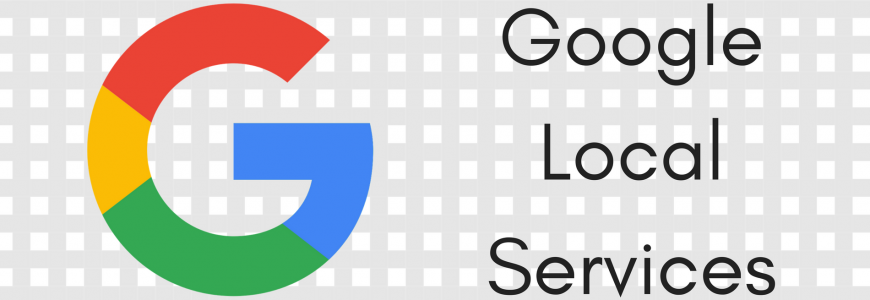Have you noticed a new type of sponsored result on Google’s search results pages? These ads are for Google’s new platform, Local Services, which Google designed to promote local service providers like plumbers, electricians, handymen, cleaners, locksmiths, and the like.
According to the official website, “Local Services ads help you connect with people who search on Google for the services you offer. Your ads will show up for customers in your area, so you can keep your calendar full.”
Sounds fair enough at first glance. But, wait—doesn’t this description sound familiar? That’s probably because it’s virtually identical to the purpose of any local online directory already in existence, like HomeAdvisor, Thumbtack, Porch, Yelp, and so on. So, why does Google claim Local Services ads are here to “help you connect with people” when such platforms are already doing just that? We’re not buying it. Instead, we have a different theory as to what Google’s true motive is…
Money.
Keep reading to find out how the Local Services platform further advances Google’s pay-to-play model, and how this may hurt small businesses like yours. But don’t panic yet: We also offer up a handful of ways you can counteract the negative effects of Local Services and keep your business in the game.
Let’s jump in!
Is Local Services Just Another Money Grab?
We aren’t here to hurl accusations around. However, given Google’s track record of monetizing everything, it’s not a stretch to come to this conclusion. You see, Google wants to be the main hub for any and all online searches—basically, any internet experience whatsoever—so it’s not surprising that Google is trying to steal this coveted traffic away from other local directories.
We would never blame a company for trying to make more money. However, that’s not the full picture of what’s happening here. The Local Services platform doesn’t just benefit Google at the expense of local directories—it also hurts small, local businesses like yours in several ways.
How does it hurt you? Well, before we dive into that aspect of Local Services, you first have to understand how the platform functions.
How the Local Services Platform Works
Local Services functions like many other online business directories out there: If you decide to sign up as one of Google’s “service providers,” you’ll have your own profile where you add details about your business, including your service area, services offered, and hours of operation. You can also manage leads and communicate with potential customers via the platform.
Mainly, though, Local Services is yet another way for Google to get money from businesses. First, in order to get the status of “Google Guaranteed” (see image below), you have to go through a comprehensive background and reputation check, which can be a costly and time-consuming process. And then, of course, you have to pay every time you receive a lead through Local Services. And this brings us to the biggest issue…
Local Services Runs on Ads
Google uses the information in Local Services profiles to generate paid ads. When people search for home services, they’ll see sponsored results advertising specific local businesses at the top of the page, above the AdWords results.
Google ranks and displays Local Services ads in order based on the following criteria:
- Proximity to potential customers
- Number of positive customer reviews
- Overall “score” (star rating) on Google
- Responsiveness to messages on the platform
- Whether they’re currently open or not
- Number of complaints about the business
Here’s an example of a local search for “plumber”:

As you can see, Local Services ads are nothing flashy—they merely show your business name, star rating, location, phone number, and hours of operation. However, they dominate the top of the search results page, even overtaking AdWords placement. Needless to say, businesses with Local Services ads are going to get A LOT more leads via Google search. But here’s the kicker…
Favoring Big Companies Over Small Businesses
Now, between Local Services AND AdWords, nearly half the search results page is taken up by paid advertisements. This only fuels the common criticism that Google is digging its heels further and further into a pay-to-play model.
In this way, Local Services is just the latest in a long line of grievances that small business can levy against Google. This is yet another example of Google favoring big businesses and screwing over the little guy.
First of all, as we outlined above, Local Services further alienates small businesses with limited budgets by making it virtually impossible to rank unless you fork over a substantial amount of cash. Plus, you have to pay for every lead that comes in through your ad.
But it gets worse…
Tanking Your Website Traffic
Not only does Local Services’s pay-to-play model prevent you from competing with your bigger competitors, but it also directly hurts your website traffic because your site is not as visible in search results. As a result of lower traffic, your SEO authority takes a hit. Moreover, you’ll look at your low visitor numbers and assume something is wrong with your site, even though your site has nothing to do with the problem.
We’ve already seen this happen with many website owners. They notice their website traffic and incoming calls have plummeted—and immediately blame their SEO provider. In reality, these low numbers are merely an unfortunate symptom of Local Services gaining prominence and siphoning off potential local customers. However, the website owner doesn’t realize this, and they get angry and fire their SEO provider.
These feelings of anger, fear, and frustration are a completely valid response to what’s happening here. But quitting your current SEO program will only lead to catastrophe. If you stop SEO, you’ll have to start over with nothing, now facing even stronger headwinds than you did before.
Your Solution: Adapt and Act!
If you’re not angry right now, check your pulse. Google has a long history of pushing this pay-to-play model, which naturally favors big companies and stacks the deck against small businesses. This isn’t anything new, per se. It always feels like Google ignores any harm done to small businesses, as long as it keeps raking in cash.
Unfortunately, we don’t have the power to tackle this Goliath head on. What we can do, however, is find ways to work around it and minimize the damage. Thankfully, the local search landscape is changing, and Google isn’t the be-all and end-all that it used to be. There are many other platforms that, when leveraged to their maximum potential, can be extremely effective at generating leads. You just have to get creative.
Here are some strategies you should consider incorporating into your marketing plan:
- Facebook Ads: Target ads to put yourself right in front of local customers on Facebook. This has proven to be a very powerful tool for many of the local business owners we work with.
- Word of mouth: Ask your existing customers to spread the word about you. Have them leave reviews on Facebook, Google, and any other directories you use.
- Branding & reputation management: Be more intentional in how you present your company. By carefully planning your brand (e.g. logo, slogan, uniforms, signage, etc.), you’ll generate more familiarity and recognition among your local community.
- PPC: Yes, we did just spend the better part of an entire blog post complaining about Google’s pay-to-play model. However, complaining doesn’t change the fact that Google is the prevailing destination for local search. You can still avoid the pains and costs of Local Services, though, by opting for an intelligently planned AdWords campaign, instead. When your campaign is designed and monitored by a savvy marketing specialist, you’ll be able to keep click costs affordable and adhere to a modest budget.
- SEO: Do the opposite of quitting your SEO campaign—invest in SEO even more! Let’s put it this way: If the local search pie has gotten smaller, you need to at least make sure your share of the pie doesn’t shrink any further.
- Community apps: There are free mobile apps like Houzz and Nextdoor where you can promote yourself to local customers who need your services. These apps will help local homeowners find your business based on what kind of home improvement project they’re undertaking.
So, the bottom line: Even though Google has made the playing field even less fair, you still aren’t powerless. Use that anger you’re feeling and funnel it into other channels. As we said above, social media platforms like Facebook are super-effective alternatives. And don’t be afraid to go offline, either: There’s plenty of real-world marketing you can do in your local community through good ol’ fashioned word of mouth and networking.
Any questions? Give us a call or fill out the contact form to chat with one of our specialists!



